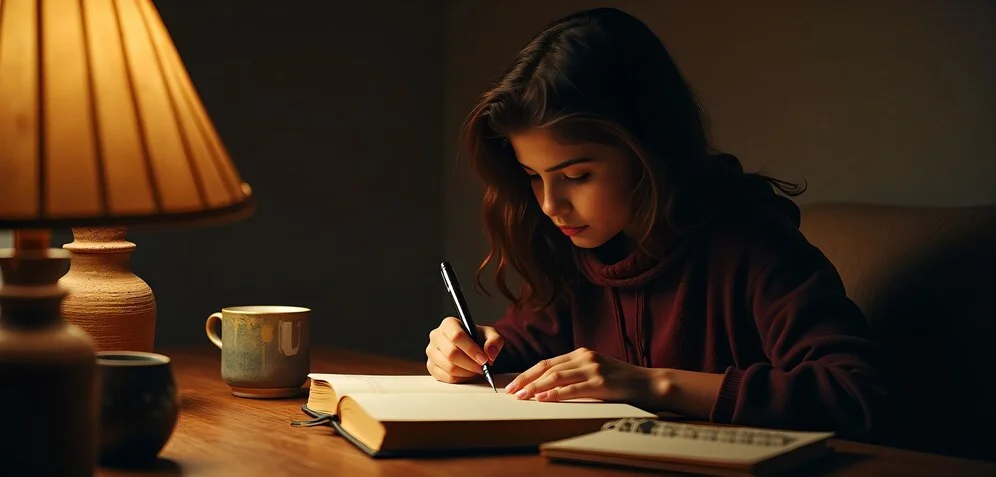In fantasy writing, word choice is important because it shapes the reader’s experience. Using the right words creates a magical, exciting, and unique atmosphere. One way to do this is by choosing powerful verbs that make each scene come alive.
This article will help writers pick strong verbs that improve their fantasy worlds. Powerful verbs can bring a story to life by showing action, creating mystery, and adding emotion. With the right verbs, writers can turn their fantasy worlds into memorable places full of wonder.
Why Verbs Matter in Fantasy Writing?
Verbs are the heartbeat of a sentence because they drive action and emotion. They tell the reader what is happening and how the characters feel. By using strong verbs, writers can make their stories more exciting and engaging.
There is a big difference between dynamic and static verbs in creating vivid images. Dynamic verbs show action, like “sprint” or “whisper,” making the story lively. In contrast, static verbs describe a state, like “is” or “was,” which can slow the pace of the story.
Verbs also shape the tone and style of a fantasy story. Choosing the right verbs can make the story feel magical, adventurous, or mysterious. This helps set fantasy apart from other genres, creating a unique world for readers to enjoy.
Categories of Verbs Suited for Fantasy
In fantasy writing, action verbs are crucial for battles, quests, and movement. These verbs, like “clash,” “soar,” and “vanquish,” show exciting events that keep readers interested. Using strong action verbs makes the story feel fast-paced and thrilling.
Mystical verbs are another important category because they evoke magic and the supernatural. Words like “whisper,” “summon,” and “enchant” help create a sense of wonder. These verbs can make the magical elements of the story come alive, adding depth and intrigue.
Descriptive verbs help paint the fantasy world with detail, giving readers a clear picture. For example, verbs like “loom,” “shimmer,” and “glide” create vivid imagery. Using these descriptive verbs enhances the setting and makes the fantasy world more captivating for readers.
Techniques for Choosing Powerful Verbs
When choosing verbs for your fantasy story, use those that match your world’s unique logic and magic system. For example, if magic is rare, use verbs that show its powerful impact. This helps create a believable and engaging setting that draws readers in.
Avoid overused or cliché verbs to keep your writing fresh and exciting. Words like “run” or “jump” can feel boring if used too much. Instead, aim for specific and interesting choices that make your story stand out.
You can also experiment by combining verbs and modifiers to create unique effects. For instance, instead of just saying “run fast,” you might say “sprint swiftly.” This technique adds flair to your writing and helps to paint a vivid picture for your readers.
Examples and Comparisons
Comparing weak verbs to strong verbs helps show the difference in a story’s impact. For example, instead of saying “The dragon was flying,” you could say “The dragon soared.” The stronger verb “soared” gives the sentence more excitement and makes the scene come alive.
A well-chosen verb can change the entire feeling of a scene. If you write “The hero walked into the room,” it feels ordinary. But saying “the hero stormed into the room” makes the action feel urgent and powerful, grabbing the reader’s attention.
Popular fantasy novels often use strong verbs to create vivid images and emotions. In “The Hobbit,” J.R.R. Tolkien uses verbs like “creep” and “glimpse” to build tension. These choices help the reader feel the excitement and danger, making the story more engaging and memorable.
Common Mistakes to Avoid
One common mistake in writing is overloading sentences with too many intense verbs. Using too many strong verbs can confuse readers and make sentences hard to understand. Instead, it’s better to mix strong and simple verbs to keep writing clear and engaging.
Another mistake is using verbs that don’t match the tone of the story or the character. For example, if your character is calm, saying they “exploded” into action feels out of place. Choosing verbs that fit the character’s emotions helps make the story believable and relatable.

Relying on clichés or generic verbs can also weaken the reader’s immersion in the story. Phrases like “the hero saved the day” feel tired and overused. Instead, using fresh and specific verbs creates a more vivid experience for readers, keeping them engaged in the fantasy world.
Bottom Lines
Thoughtful verb choice is essential in crafting memorable fantasy worlds because it brings scenes and characters to life. Strong verbs make actions vivid, helping readers feel the magic, tension, or excitement in every moment. By choosing the right verbs, writers can build unique worlds that feel real and captivating.
Writers should practice and experiment with verbs that match the style of their fantasy story. Exploring favorite fantasy books can also be helpful, as great authors often use verbs that create a strong atmosphere. Observing how these verbs are used can inspire writers to enhance their own storytelling.
Frequently Asked Questions (FAQs)
Q1. How to choose the right tense for your novel?
To choose the right tense, think about when the story is happening. Present tense makes it feel like it’s happening right now, while past tense makes it feel like it already happened. Try reading both and see which one fits your story best.
Q2. What is the best tense for fantasy writing?
The best tense for fantasy writing is often past tense because it feels like a story being told. However, some writers use the present tense to make it feel more immediate. It depends on the mood you want for your fantasy world.
Q3. Can you switch tenses when writing a story?
Yes, you can switch tenses in a story, but do it carefully. Many writers change tenses only for special parts, like flashbacks or dreams. Keeping it clear helps readers understand the time in your story.
Q4. What tense do fiction writers use?
Fiction writers often use past tense because it feels natural and familiar to readers. Past tense lets the writer tell the story as if it has already happened. However, some writers use the present tense for a more immediate feel.
Q5. What tense is Harry Potter written in?
Harry Potter is written in the past tense, which makes it feel like a magical story from the past. This helps readers feel like they’re hearing an ancient tale. Past tense is popular in fantasy books for this reason.
Q6. Can you mix tenses in fiction?
Yes, you can mix tenses in fiction, but it’s important to do it carefully. Writers often use past tense for most of the story but switch to present for exciting or intense moments. Mixing tenses can add interest if done thoughtfully.









